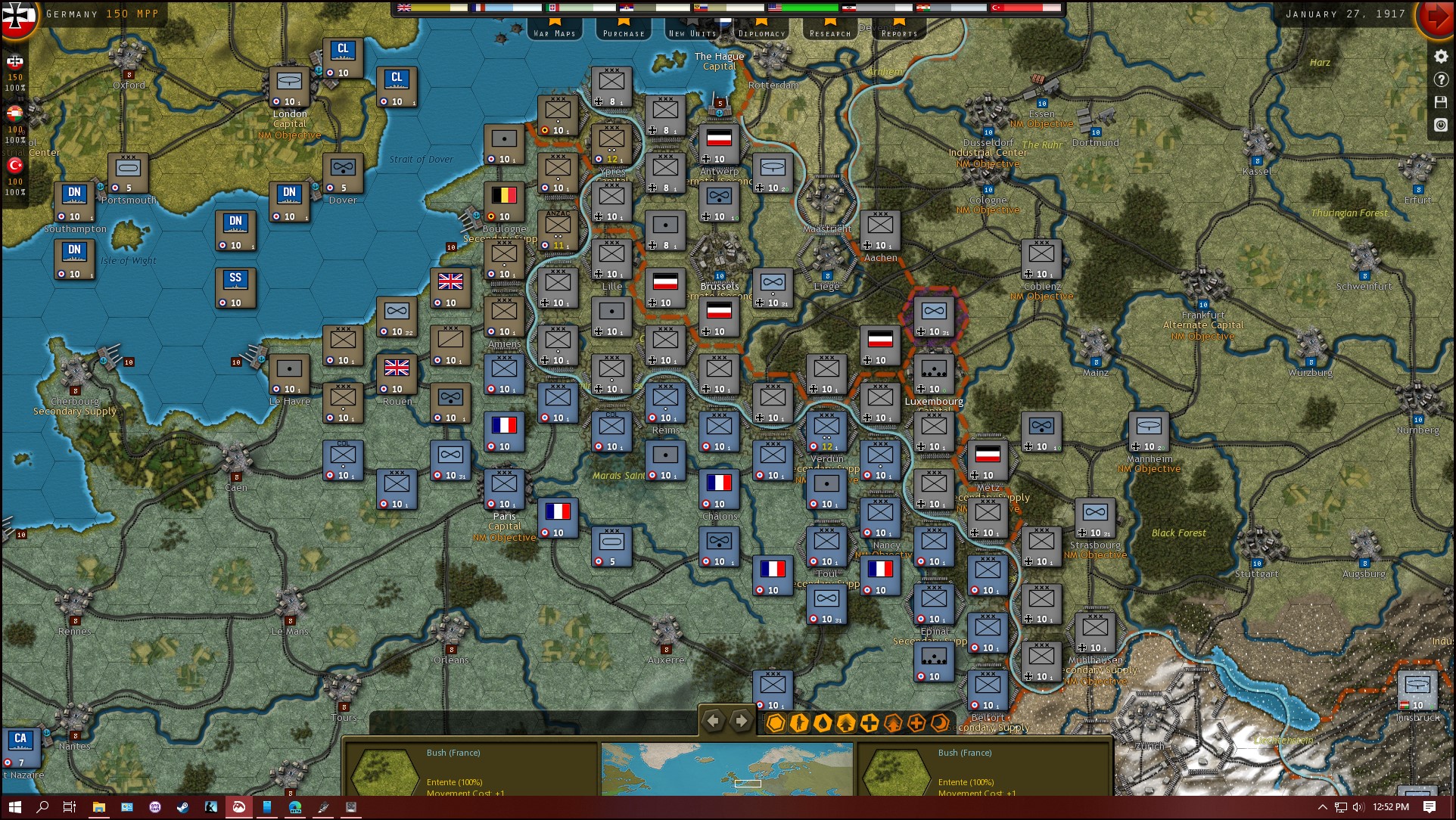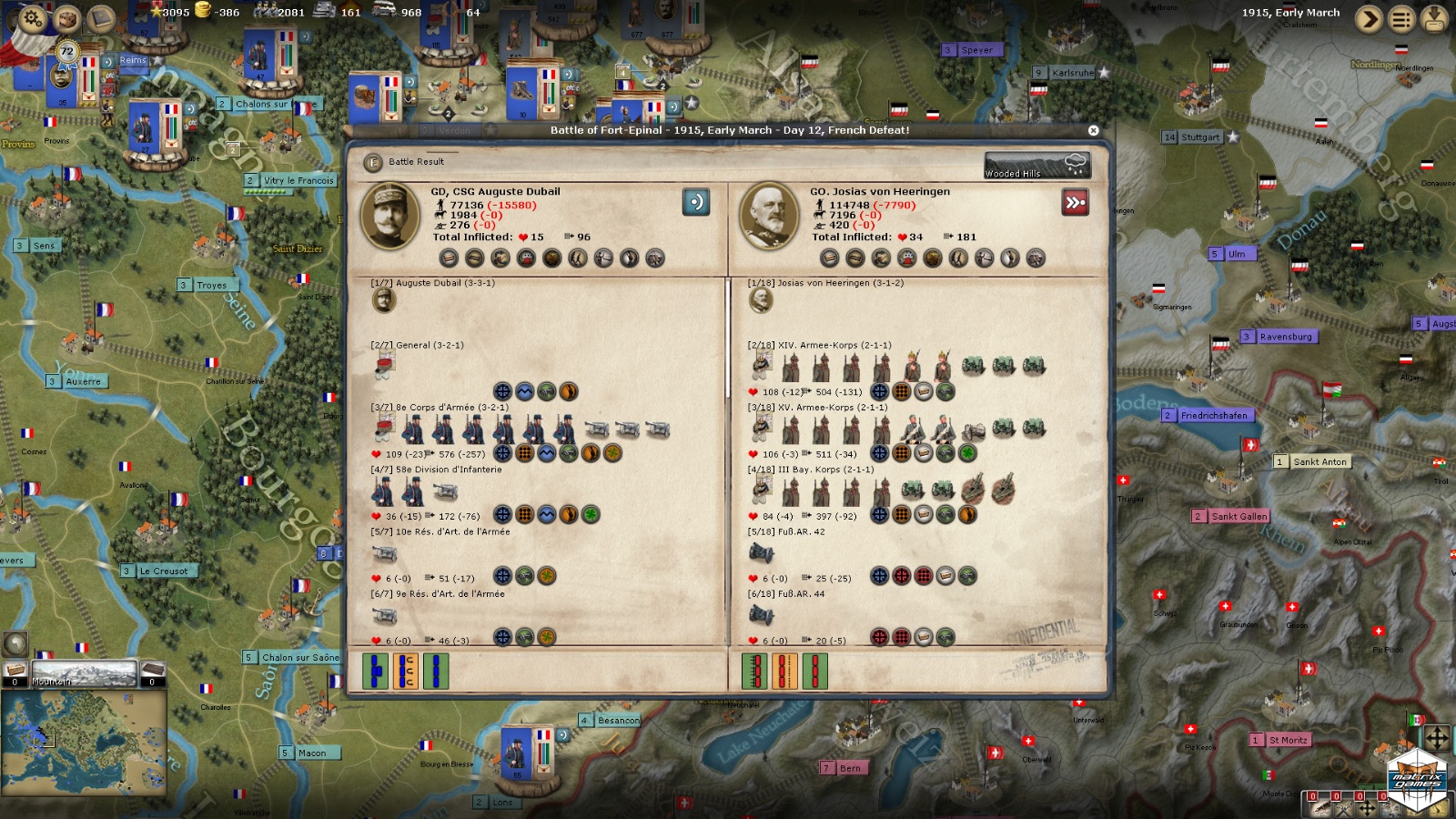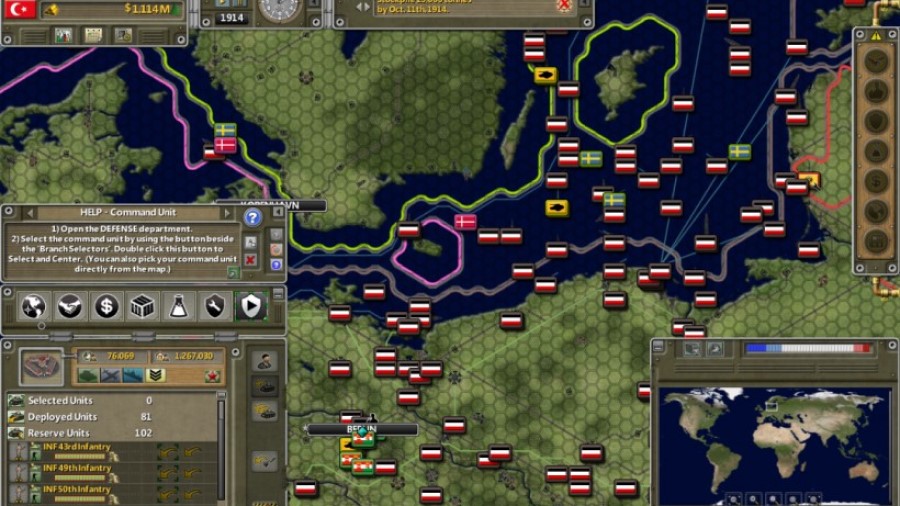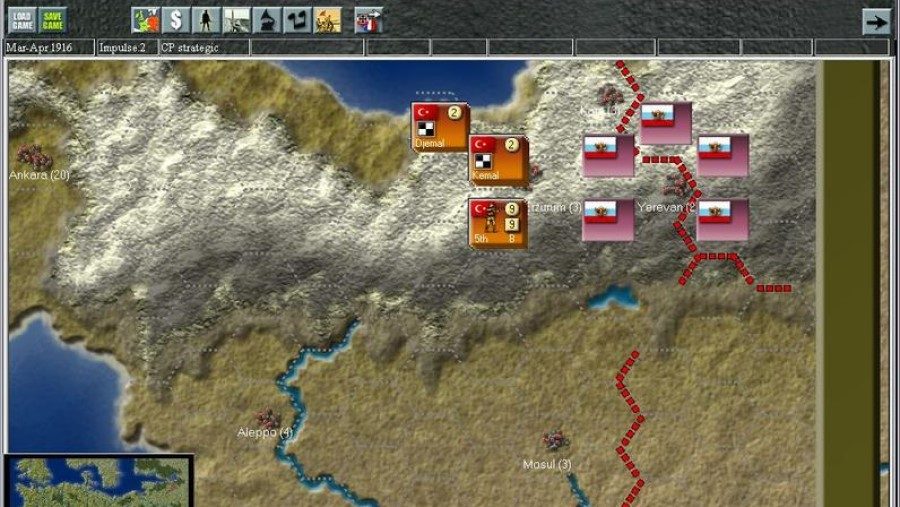The centenary (100-year anniversary) of the end of World War One has now passed. While the subject has seen renewed interest these past few years generally, there haven’t been many decent new WW1 games in the computer wargame space, so this list remains – much like the titular conflict’s trench warfare – fairly static. That said, there are some excellent classics you should play if interested – and we’ve profiled the best games below.
These excellent titles cover three different ‘scales’ of playing through the Great War: the strategic level, operational level, and tactical level. There are more WW1 strategy games than tactical level games here, but there’s something for everyone – we’ve even thrown in a flight sim.
Also, while we’ve not had a chance to try it out ourselves yet, our sister site PCGamesN has a superb preview on The Great War: Western Front that all fans of WW1 PC games, and RTS games in general, can enjoy.
For some tabletop alternatives, you might try our guides to the best WW1 board games, or best war board games in general – but, for now…
The best WW1 games in 2023 are:
Supremacy 1914
Bytro Labs’ Supremacy 1914 gives you the chance to take control of any of the nations involved in the First World War, with players all around the world playing as all the other nations (or AI filling in if that’s not possible). No two nations play exactly the same, with different resources available to all of them, and the ability to create weapons and munitions which are in-line with what that particular country had at that point in history.
What makes this game particularly appealing is the fact that it’s free to play. If you don’t want to fork out for a new game right now, but need a bit of a strategy game fix, then Supremacy 1914 is definitely one to take for a spin. There’s nothing quite like playing alongside 499 other players in such a drawn out, intricate strategy game. You’ll be hooked in no time.
 Buy Now
Buy NowStrategic Command: World War 1
The developers at Fury Software are masters of their craft, and it’s fitting that after they’d finished making the ultimate WW2 grand strategy war game, they’d move on to (re)make the ultimate WW1 game – Strategic Command: World War 1. Taking all of the experience and refinement they’ve learned over the past few years, the team decided to have another stab at the Great War by remaking one of their earlier titles that covered the same period.
Update graphics, a new engine and mechanics all serve to make this a pretty special WW1 strategy game. So much so that Bill declared SCWW1 to be his new ‘go to’ WW1 war game, replacing the much celebrated Guns of August. If that’s not endorsement enough, I don’t know what is.
You may also want to check out a previous entry on this list and SCWW1’s predecessor, Strategic Command Classic: WW1. It’s a much older game and hasn’t benefited from the refinements later Fury Software games have enjoyed, but it’s still pretty good.
Guns of August 1914-1918
The older graphics and mechanics in Guns of August 1914-1918 are clunky, but capture the crucial problem of the combatants: a war in which the resources and military thinking of the coalitions were outstripped by industrial warfare. In the four scenarios marking each year of the war, players must choose which HQs to activate given a limited number of activations.
Points are used to research tanks, gas, trenches and to influence or declare war on neutrals. Ships are assigned orders and areas while subs starve Britain. Air units are assigned to fronts. Play uses two-month turns composed of impulses resolved simultaneously. The map covers Europe, the Middle East and some of North Africa. Each nation of a coalition is handled separately. National morale and exhaustion determine victory. The game replicates the attrition aspect of World War I quite well.
Commander: The Great War
Slitherine’s 2012 game Commander: The Great War shows how the Commander engine could handle World War I. The terrain and unit graphics combine simplicity with enough detail to make them interesting as well as informative. Mechanics are simple with tabs bringing up panels for research, diplomacy, production, and selection to show unit stats. A management panel shows countries’ overall status. Submarines are always submerged and can be attacked only when the enemy stumbles into their hex.
Air, artillery and infantry capabilities grow through research. Commanders are attached directly to units instead of separate HQ units. A unique swapping function allows units to easily exchange places. The five campaigns cover each year of the war. Research focus on broad topics instead of individual concepts while a simple supply system makes this game accessible to new gamers and still captures the essence of the topic. You can pick it up on PC from the Matrix Store, and it’s also available on iOS.
 Buy now
Buy nowTo End All Wars
Using a better engine this game features two-week turns, while the main map covers Europe with off-map boxes for the rest of the world. Units begin as single armies but can be broken down by increments to regimental level. Leaders can be attached, promoted and demoted under certain circumstances. Lists and map filters lay out the many factors of play. Movement is the AGEOD click-and-drag engine with a battle mode for selecting tactics. Weather affects movement and supply.
Success on the field and triggered events yield diplomatic points and decreases or increases national morale. Players can use regional decisions to accomplish operational goals where diplomacy is a matter of alignment. Submarine warfare is more abstract than in other games. An expansion module called Breaking the Deadlock is available.
 Buy now
Buy nowSupreme Ruler – The Great War
Battlegoat Studios’ Supreme Ruler – The Great War is concerned more with logistics and resource management as opposed to putting rounds down range, but there are several areas which make play unique. There is a full-fledged weather system, while movement is a simple process of drawing a line from start to destination, then allowing the AI to figure out the best way to get there. And believe it or not, all of this is done in semi-real time. The detail in the game is fantastic and doesn’t simply allow of things like heavy artillery. No, the player must choose the type of gun – 130 mm vs 152 mm for example – for his rubles based on what was historically available.
But the BIG draw of the game is the scope. While most games define World War I as East Front, West Front, Italian Front and Lawrence of Arabia, this game takes the term “World” literal. The game covers the entire globe, so if Japan invades China, you move to that real estate and fight/produce it out. And you don’t stop in 1918 but can continue the game on well into the 21st Century. Fun fact: Battlegoat is now taking their ‘Supreme Ruler‘ series into Space with Galactic Ruler.

Hearts of Iron: Darkest Hour
Paradox Interactive’s Hearts of Iron series needs little introduction as one of the most famous strategic World War II games ever. Hearts of Iron: Darkest Hour is actually a variant of HOI Armageddon created by a group of dedicated modders in love with the series. It is a stand-alone game with two scenarios, one beginning in 1936, but the other in 1914 covering WWI.
It’s a typical strategic logistics and production fare, but using the HOI engine and overall design as the selling point. Often called the best of all HoI add-ons, the game has outrageously high reviews on Steam. Trust me, if you like Hearts of Iron, you will like this.
Serbia ’14
It’s nice to see John Tiller Software (JTS) still making games for its ‘First World War Campaigns’ series – France ’14 & Prussia ’14 below is pretty much all we had for a while, but the latest entry in the series offers an excellent look at this often overlooked part of WW1’s history. It’s available on the JTS Store.
Serbia ’14 contains 28 stand-alone battle scenarios, four multi-scenario campaigns, a small multi-scenario campaign on the Serbian invasion of Bosnia, and three grand campaign scenarios combining Serbia, France, and East Prussia ’14 into one huge, quarantine-breaking conflagration. It also covers the initial 1914 offensive right through to the final operations in 1915.
France ’14 and East Prussia ’14
Scale is 1 km per hex, two hours per turn with battalion sized units. John Tiller’s 2010 offering, France ’14, is only one of two legitimate World War I operational level games. The 3D icons are too small for easy use but the 2D counters and the meticulously detailed terrain provide a satisfying experience enhanced by the colorful uniforms in the info boxes. Weapons include early reconnaissance aircraft, German siege guns, and French 75s. Fortifications like Liege show the difficulty in taking chains of strong points.
Lessons from fighting the first five weeks of conflict all revolve around time. Going from travel to combat mode takes time even for the ubiquitous cavalry units. The fast movement required by the plans of both sides means more and more HQs go out of the chain of command as campaigns continue. Movement to contact requires the use of roads creating traffic jams. All these factors combine to show why the maneuver was so slow. The game’s companion package, East Prussia ’14, is similar but more fluid with greater movement. Both games can be linked into a single campaign.
Battle of Empires 1914-1918
Battle of Empires 1914-1918 is a bit of cautionary recommendation, only because the technical health of the game can fail to meet expectations. Still, we’re great fans of the Men of War series, and this is essentially a spin-off WW1 game based on the same engine. It’s surprisingly authentic in how it recreates the soldiers, weapons and equipment of the era, and the developers have adapted the mechanics well to suit how warfare worked for the period.
Bill was especially impressed in his review, and the single player offers a fairly robust series of unlinked scenarios, with many factions covered now via DLCs and add-ons. Multiplayer has always been the core of the Men of War experience, and there’s still a community there to engage with should you feel so inclined, but you can also do the narrative missions in co-op if you want.
Squad Battles – First World War
John Tiller Software addresses turn-based small unit tactics in its 2014 offering Squad Battles – First World War – a game where units are leaders, squads and companies, and where hexes are 40 meters across with each turn covering five minutes of time. The 2D graphics show the troops’ heads while 3D figures stand on bases. Terrain ranges from the shell hole Hell of the Western front to the beaches of Gallipoli.
The 67 scenarios include two linked campaigns covering the entire war so that Turkish, ANZAC and Canadian troops get their due. The full panoply of weapons shown include trench knives to grenades to poison gas and tanks. Seven separate campaigns follow field officers including Major Charles W. Whittlesey of “Lost Battalion” fame.
Rise of Flight
We promised you a simulation of the terrifying balsa wood flying machines that plied aerial warfare in the 14-18 war, and here it is in the form of 1C Games’ Rise of Flight – time to join the twenty-minuters!
Gorgeous graphics support likely the most realistic game on this list, While you can reduce the complexity, full throttle this game is an air force grade simulator that would make Manfred von Richthofen’s jaw drop. Cockpits are meticulously rendered and require you to fly the plan as did the lads in 1916. Some aircraft did not have a throttle but required the pilot to change the fuel mixture level, and this game does likewise.
Your Pfalz D.XII stall? Well, you’ll need to turn the engine off to recover, because that’s really the way it was. Also unique is the game’s business model. You can download the software along with three planes and play Rise of Flight free, forever. But getting additional planes and upgrades costs extra. Being a Russian software company, you also get access to a lot of planes you likely have never heard of, such as the Gawd awful huge Sikorsky S-11 Muromets bomber (which will cost you $20.00 US, by the way).
If you fancy moving your historical gameplay onwards a few years (or turning the clocks back), check out our fully tested guides to the best:
Source: Wargamer










